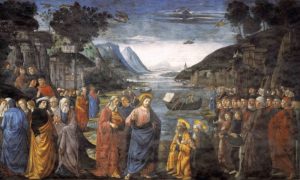Thoughts on Sunday’s Lessons for June 18, 2017

The Vocation of the Apostles (1481). Fresco by Domenico Ghirlandaio. Sistine Chapel, Vatican City, Rome.
Through the long stretch of Sundays after Pentecost that has now begun and continues until Advent, churches may choose to follow either of two Lectionary “tracks,” with separate First Readings and Psalms. The First Readings for Track One will take us through the Bible’s story of God’s chosen people, from the patriarch Abraham to Isaac, Esau and Jacob, Joseph, Moses and Joshua. Today we hear the very start of that narrative: God’s assurance, through three mysterious strangers, that Abraham and Sarah will have a son, and that their offspring will inherit the Promised Land. Sarah finds this hilarious because of their great age, but God’s promise is fulfilled in their son, Isaac.
First Reading (Track Two): Exodus 19:2-8a
Through the long stretch of Sundays after Pentecost that has now begun and continues until Advent, churches may choose to follow either of two Lectionary “tracks,” with separate First Readings and Psalms. In Track Two, our First Testament readings are generally chosen to have some relationship with the week’s Gospel in theme or theological point. We begin today with Moses, in a narrative from which we may hear distant echoes in today’s Gospel, taking God’s words to the elders of the people and gaining their agreement to be in lasting covenant with God.
Psalm (Track One): Psalm 116:1, 10-17
We heard this same Psalm just a few weeks ago, midway in Eastertide. It is a Psalm of thanksgiving, clearly intended as a grateful prayer thanking God for recovery from illness. In the verses just preceding, it offers a vivid image of the anguish of illness and the fear of death. We are spared those words today, though, moving directly into the verses that sing of the transforming joy that comes with recovery and resurrection. In the joy of restored life, the Psalm offers thanks to God who frees us from the snares of death.
Psalm (Track Two): Psalm 100
Does this joyful hymn sound familiar? If you’ve worshiped in Morning Prayer, you have probably joined in reciting it as the Jubilate, one of the options available in the “Invitatory and Psalter” near the beginning of the service. It draws its joyous theme from the recognition of the truth that Moses gave the elders: that we are God’s creation, God’s own people, and – using the metaphor that we know and love in Psalm 23 – the sheep of God’s pasture.
Second Reading: Romans 5:1-8
For the next three months we will be hearing excerpts from Paul’s great letter to the Romans, in which he beautifully works out his evolving theology of Christ, the Spirit and salvation. He is writing at a time when Rome’s Jewish Christians were just returning from exile, while its formerly pagan Christians had faced persecution at home. We begin with another reading that we have heard recently, during this past Lent. Paul encourages the Roman Christians to love each other and heal their differences in spite of their own suffering, reminding them that Jesus suffered and died on the Cross. He urges them to learn endurance in their own suffering, remembering that even though they are sinners, they are justified through faith and saved through the cross.
Gospel: Matthew 9:35-10:8(9-23)
Throughout this long season after Pentecost, our Sunday Gospels will take us through Matthew’s account of Jesus’ life and teaching, following Jesus to the eve of his Passion as the liturgical year ends in November and we turn to Advent and Christmastide. Today we hear Jesus, who has been teaching and healing on his own, selecting 12 apostles to help. He gives them power to heal and exorcise, and charges them to go out to the “lost sheep of the house of Israel” to proclaim the good news that the kingdom of heaven has come near. The rules are strict: Accept no pay. Take only the most basic possessions along. Don’t stay with those who don’t welcome you. Be prepared for persecution and hate, but know that the Son of Man is coming soon.
